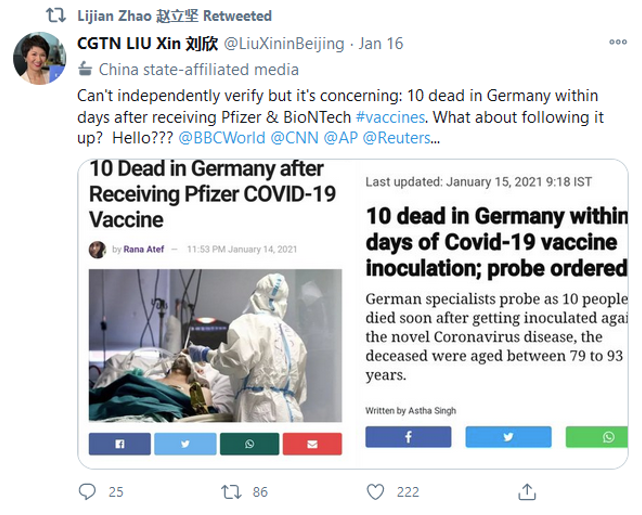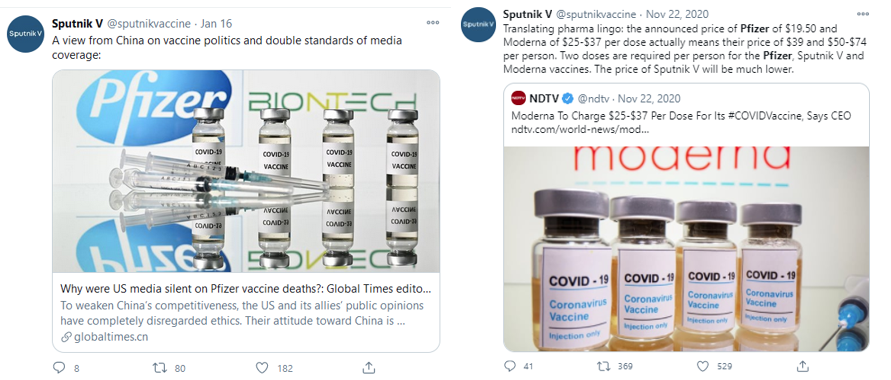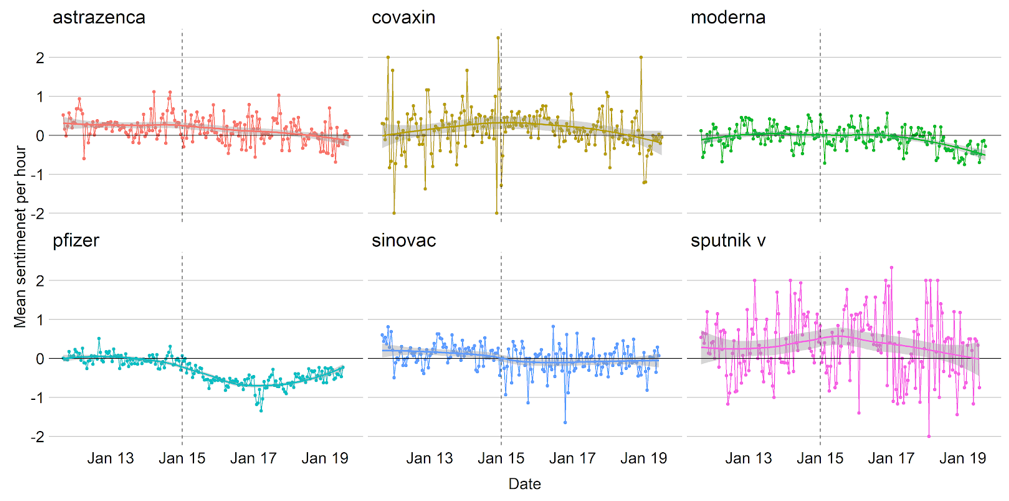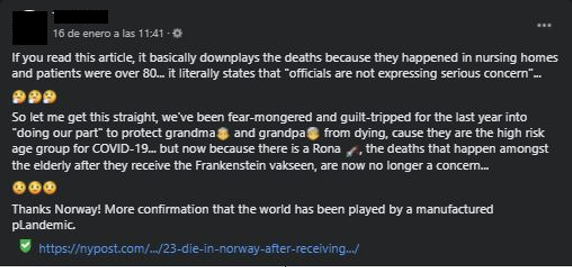Chinese and Russian influence campaigns risk undermining Covid-19 vaccination programs
Posted By Ariel Bogle and Albert Zhang on January 22, 2021 @ 15:22

As the world bets on vaccines as a way out of the Covid-19 pandemic, vaccine candidates have quickly become a vehicle for national influence. China, Russia and India, for example, are each quick to publicly celebrate, through traditional media and official social media accounts, every [1] new [2] country [3] that signs up to use their vaccines.
Stories are often promoted that emphasise the safety and affordability of countries’ vaccines. However, as vaccine-producing countries jostle for market share and political leverage for their products, some are prepared to resort to disruptive or deceptive tactics.
The battle over vaccine narratives has led to online influence and disinformation campaigns that aim to mislead or to amplify potentially negative news about rival vaccine candidates without proper context. Such behaviour could erode public trust and vaccine uptake, delaying global efforts to eradicate the disease and recover from the severe social, political and economic damage caused by the pandemic.
Russia reportedly went so far as to launch a covert disinformation campaign [4] in 2020 designed to target and discredit the AstraZeneca/Oxford University vaccine. And already this year, both Chinese and Russian state media and official social media accounts have amplified unfavourable reporting about the Pfizer vaccine.
In early January, the Norwegian Medicines Agency reported that around 30 people [5] died after receiving the Pfizer vaccine, most of whom were described as ‘frail’ nursing-home residents. While Pfizer is an American company, the vaccine was developed by an international team.
The news attracted considerable attention, including in Australia, where the government sought more information [6] from Pfizer and Norwegian health authorities. It remains unclear ‘whether the reported deaths following COVID-19 vaccination are simply a function of age and declining health, or whether the vaccine may have played a role’, according to ABC News [7]. The Norwegian Medicines Agency has since said there was not yet evidence [8] of a direct link.
These reports were seized on by media in China and Russia, as well as by anti-vaccination influencers on social media. In addition to highlighting the deaths in Norway, one narrative pushed by state-linked media outlets focused on perceived double standards by Western media in their coverage of negative stories about their countries’ candidates. A 15 January editorial in the Global Times [9] suggested that ‘major US and UK media were obviously downplaying’ the deaths.
Chinese and Russian vaccines have faced tough questions about their efficacy and the robustness and transparency of their testing regimes [10]. In recent weeks, a Brazilian trial of a vaccine [11] made by China’s Sinovac Biotech found that it was 50.4% effective at preventing symptomatic infections in ‘very mild’ cases, a lower success rate than was initially indicated.
Tweeting about the Norwegian Pfizer incident on 16 January, a reporter for China’s state-owned broadcaster CGTN asked whether any ‘major US or European media’ had picked up the story. ‘Not that I can see’, she wrote. ‘Imagine if 13 people are assessed to have died from Chinese-made #vaccines, it would have made headlines EVERYWHERE!’
The same day, she tweeted two screenshots of headlines about potential Pfizer vaccine-linked deaths in Germany. Without context—10 older people reportedly died [5] out of an estimated 800,000 Germans vaccinated [12]—the screenshots paint a frightening picture of the vaccine’s potential side effects.

Both tweets were retweeted by Zhao Lijian, a spokesperson for China’s foreign ministry, who has more than 877,000 followers.
On Facebook, the 15 January Global Times story received at least 7,200 interactions on public posts, according to the social monitoring platform Crowdtangle. It was shared by the verified account of French politician François Asselineau, which received the most Facebook interactions, followed by his party page, Union Populaire Républicaine.
Another story on 19 January [13] said Chinese health experts were advising Australia to halt approval for the Pfizer vaccine following the deaths in Norway. ‘Australia should broaden its choices of COVID-19 vaccines, such as purchasing Chinese-produced inactivated vaccines’, the article said.
The claimed lack of Western media coverage of alleged Pfizer vaccine-related deaths was also echoed by Russian state-linked social media accounts and outlets. Sputnik News ran a story [14] claiming, ‘Despite numerous signs of the Pfizer vaccine having side effects, the American shot has not received that much scrutiny in the mainstream media.’
The Twitter account linked to Russia’s Sputnik V vaccine, @sputnikvaccine, shared the Global Times opinion piece, commenting, ‘A view from China on vaccine politics and double standards of media coverage’, as well as other reporting about the Norway incident. Since late 2020, the account has tweeted news coverage highlighting the price of the Pfizer vaccine compared with Sputnik V and the risk of allergic reactions to the Pfizer vaccine.

Russia Today has also reported on Pfizer side effects that have not been confirmed as definitively linked to Covid-19 immunisation. For example, a link to a story in Russia Today about one woman’s potential yet unconfirmed side effects [15] received more than 11,000 interactions in the form of reactions, comments and shares on Facebook, according to Crowdtangle, and was shared by a number of prominent anti-vaccination influencers.
Our analysis of 455,940 tweets mentioning vaccine-related terms between 11 January and 19 January found an overall shift towards negative sentiment on vaccines following the Norwegian Medicines Agency report. This suggests that negative portrayals of one vaccine might erode public trust in all vaccination programs.
Tweets mentioning ‘pfizer’ had the greatest relative increase in negative sentiment across the eight-day period. Sputnik V and Covaxin both also had highly variable sentiments reflecting polarising debates over each vaccine on Twitter. In the graphic below, positive and negative numbers represent degrees of positive and negative sentiments.

The amplification of stories about vaccine side effects or deaths that are not definitively linked to immunisation without proper context has the potential to undermine public health and may be seized upon by the anti-vaccination community.
A number of anti-vaccination influencers also jumped on the Pfizer story. Similar to the CGTN reporter’s tweet about Pfizer, some users posted screenshots of media headlines that could cause fear when presented without context on social media networks such as Facebook, Twitter and Instagram.

News outlets must take particular care with their headlines, recognising how they can be displayed in screenshots and posted on social media to serve particular agendas. As CNN has reported [16], headlines without proper context create ‘the risk that people see only that there have been fatalities and get the false impression coronavirus vaccines are dangerous’.
Proper scrutiny of all Covid-19 vaccines is essential to ensure public trust and safety. And as vaccination programs roll out around the world, reporting about allergic reactions and deaths will continue—even when a clear link with a recent inoculation has not been established. If nations continue to deliberately amplify such stories without proper care, it could have a dangerous impact both on vaccine uptake and trust in the public health agencies tasked to deal with ending the pandemic.
Article printed from The Strategist: https://aspistrategist.ru
URL to article: /chinese-and-russian-influence-campaigns-risk-undermining-covid-19-vaccination-programs/
URLs in this post:
[1] every: https://twitter.com/shen_shiwei/status/1350395583555489797
[2] new: https://twitter.com/narendramodi/status/1352277819494080514
[3] country: https://twitter.com/sputnikvaccine/status/1352299854261837828
[4] launch a covert disinformation campaign: https://www.thetimes.co.uk/article/russians-spread-fake-news-over-oxford-coronavirus-vaccine-2nzpk8vrq
[5] around 30 people: https://www.abc.net.au/news/2021-01-19/norway-deaths-australia-tga-pfizer-covid-vaccine-evaluation/13066948
[6] sought more information: https://www.abc.net.au/news/2021-01-17/norway-coronavirus-pfizer-vaccine-reported-side-effects-deaths/13064910
[7] according to ABC News: https://www.abc.net.au/news/health/2021-01-18/cause-of-pfizer-covid-vaccine-norway-deaths-not-clear/13067588
[8] has since said there was not yet evidence: https://www.bloomberg.com/news/articles/2021-01-18/norway-finds-no-direct-link-between-elderly-deaths-and-vaccine
[9] A 15 January editorial in the Global Times: https://www.globaltimes.cn/page/202101/1212939.shtml#.YAIUx6pYh4Q.twitter
[10] about their efficacy and the robustness and transparency of their testing regimes: https://www.statnews.com/2021/01/14/with-covid-19-vaccine-nationalism-is-a-worrisome-trend/?
[11] a Brazilian trial of a vaccine: https://www.reuters.com/article/health-coronavirus-malaysia/chinas-sinovac-defends-covid-19-vaccine-after-disappointing-brazil-data-idINKBN29I13L
[12] an estimated 800,000 Germans vaccinated: https://www.n-tv.de/panorama/Institut-prueft-zehn-Todesfaelle-nach-Impfung-article22292066.html
[13] Another story on 19 January: https://www.globaltimes.cn/page/202101/1213297.shtml
[14] a story: https://sputniknews.com/world/202101191081817760-as-pfizer-side-effects-emerge-why-is-the-west-still-overlooking-russian-anti-covid-vaccines/
[15] story in Russia Today about one woman’s potential yet unconfirmed side effects: https://www.rt.com/usa/512830-griner-mother-pfizer-vaccine-video/
[16] CNN has reported: https://www.cnn.com/2021/01/19/china/china-vaccine-disinformation-intl-hnk/index.html
Click here to print.